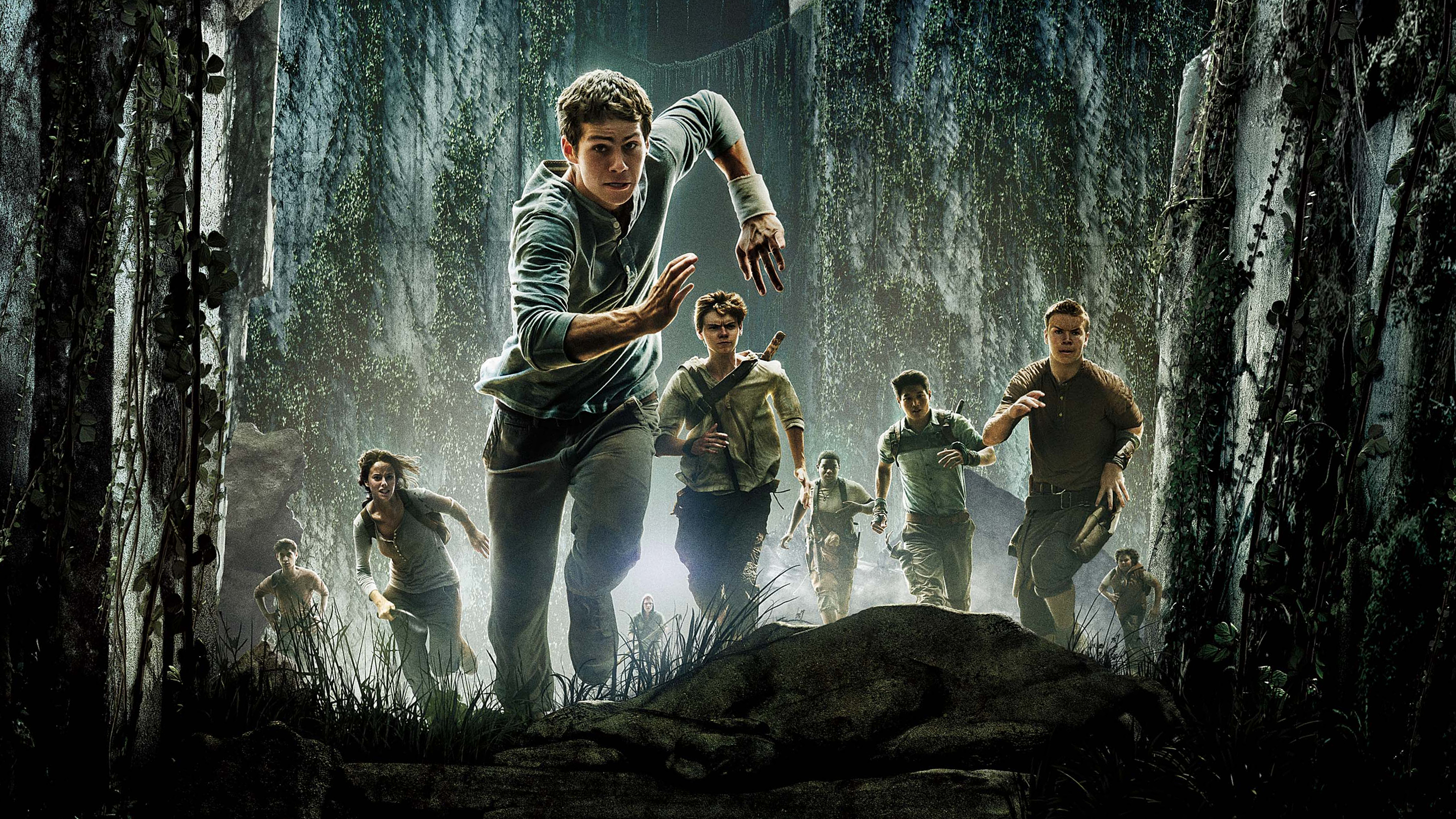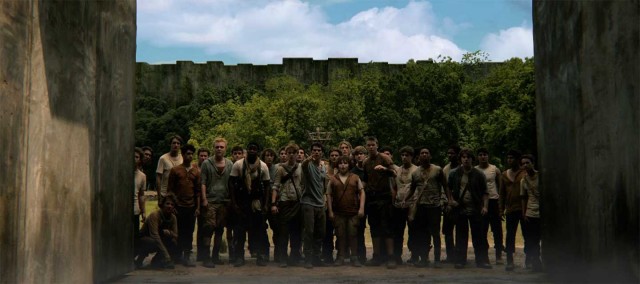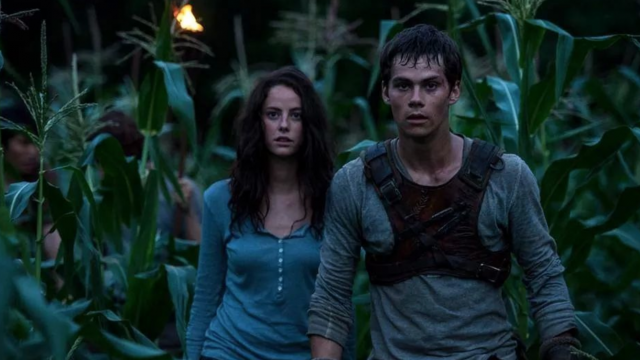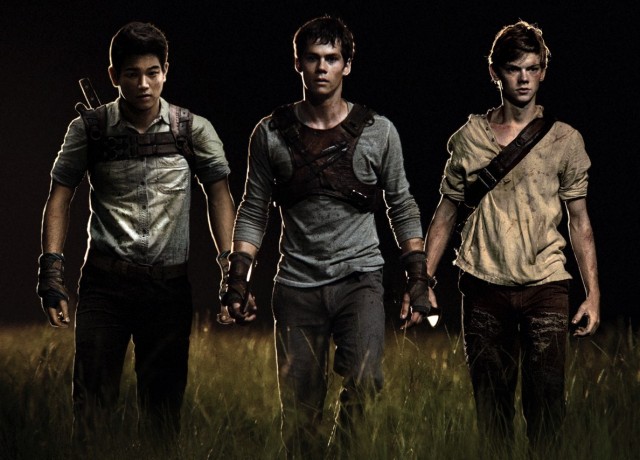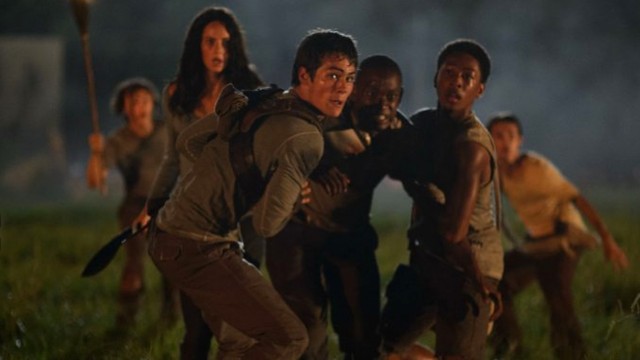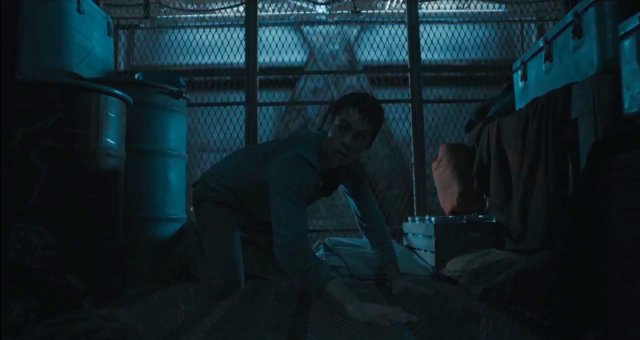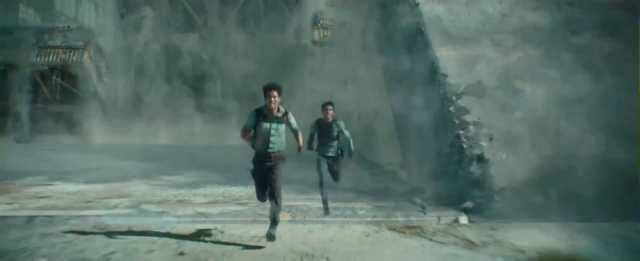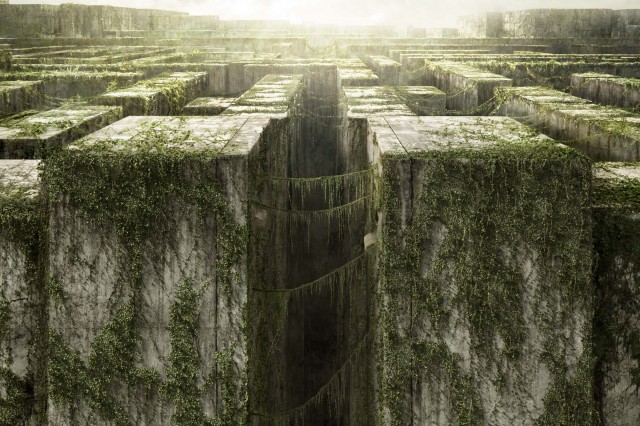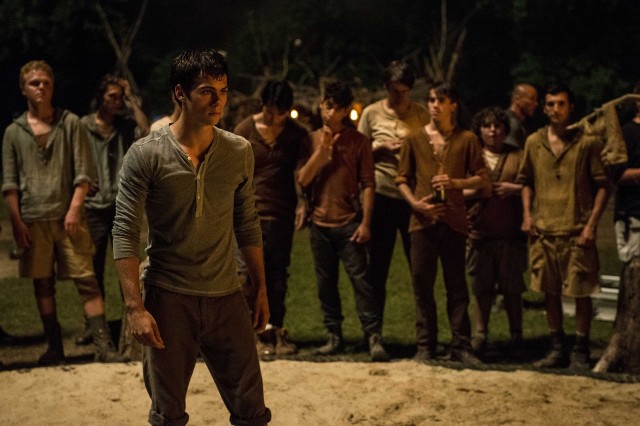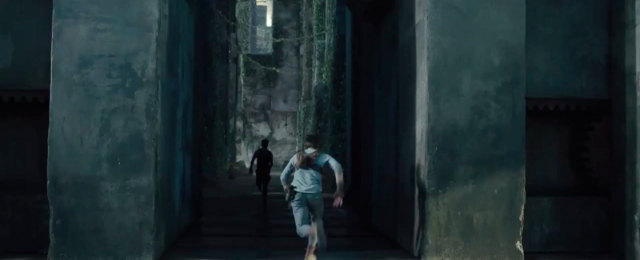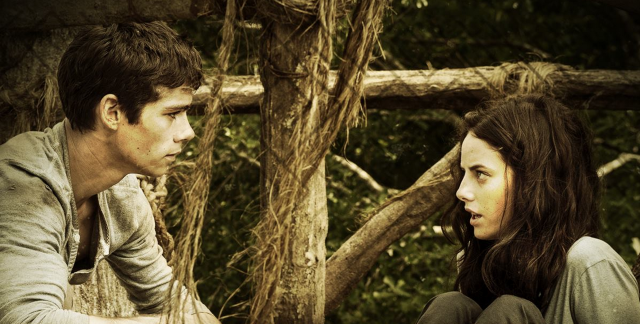The Maze Runner is a pretty unapologetic The Hunger Games wannabe. It comes in a year when we already had a pretty blatant The Hunger Games wannabe in March’s Divergent as well. Unlike Divergent however, which seemed to have delusions of grandeur by placing itself in prime March real estate and passing itself off as the new hip fad when it did nothing to earn such status, 20th Century Fox seems to be fully aware of the fact that The Maze Runner is a pretty hollow effort to cash in on the dystopian young adult novel demand that followed The Hunger Games.
As such, it’s been left to fester in the September dumping ground of studio garbage. Unlike Divergent however, which suffered from its over-confidence at the box office and with critics, The Maze Runner at least stands as a better movie than September usually offers, even if it’s still a pretty flawed one in some places. Because of this, it’s a welcome reprieve from much of the drudgery that comprises the rest of the month, if you just want a half-decent sci-fi experience.
Sure, the performances are pretty weak in several places, and the massive sequel-baiting towards the end is really irritating, but The Maze Runner at least succeeds at being a passable diversion, with just enough originality to distract from the fact that it only exists because another movie started a trend.
The Maze Runner may borrow its style and inspiration from Suzanne Collins’ beloved trilogy, but its cast feels more ripped from William Golding’s dark literary classic, Lord of the Flies. Our lead character, Thomas, is the latest addition to a group of teenage boys who are left to try and survive in The Glade, an expanse of land surrounded by a massive maze of concrete and steel, and the movie proceeds from there.
Thomas himself is a brick, a bland ‘chosen one’ protagonist that doesn’t have any real personality. It’s the supporting cast that’s left to pick up the slack, particularly since Dylan O’Brien too often looks bored and disengaged in the lead role.
Several of the supporting characters do nicely pick up the slack though, including Alby, the group’s leader and the first boy that was sent up to The Glade, Newt, the exposition expert who is the only person that can get off his high horse long enough to explain things to the audience (more on that soon), Chuck, the young and idealistic runt, and Gally, the abrasive stickler. The fact that they have weird names isn’t adequately explained, and just feels like it’s in place because it’s a YA sci-fi novel trope these days, but at least they have better personalities than our boring lead.
Oh, but, naturally, Thomas wanting to upset society’s order enough to find the first hint at a way out of the maze is what gets him noticed by The Runners, a group of boys who move through the maze by day in an effort to find a way out, before the maze shuts at night, trapping whoever is inside. This may seem simple, but apparently, like a good old dungeon crawler video game, the maze changes its layout every night.
The maze is the coolest idea that The Maze Runner has, naturally, and it’s within the maze itself that the movie’s most exciting moments happen. The characters see their best development, as well as their coolest moments, particularly when they battle against murderous monsters lurking in the maze called Grievers. Like the boys’ lifestyle, the maze is the center of the movie’s existence. It’s what separates it from being just another forgettable YA sci-fi adaptation.
It’s a shame then that the movie takes so long to actually make Thomas a Runner, and start actually exploring the maze. For most of the early portions, The Maze Runner tries to act like it’s more mysterious and cool than it is, and the rate that it just throws weird, unexplained occurrences at Thomas and the audience just becomes dull and frustrating.
This is made worse by one of the movie’s worst flaws; The fact that the characters are needlessly vague about their circumstances for no reason. Seriously, if I were Thomas, I’d be asking what the hell everyone’s problem is!
If The Glade is meant to be a perfect society where everyone relies on each other and has to help each other to survive, why in the world would the boys keep Thomas in the dark as much as they do? It doesn’t make sense. If they’re so worried about Thomas shaking up their laws and principles, why would they constantly refuse to tell him things? Doesn’t his compliance come more easily if he knows what he needs to know? Yes, they’re teenagers, and you could make the argument that they’re idiots that way, but rather than add intrigue, the characters being so stingy with their knowledge, with no reason to act this way, simply amounts to lazy writing.
Things only get worse when the token female character, Teresa shows up, and has no personality beyond being, “The girl”, simply meant to force a mystery where none needs to exist. It’s a blatant exercise of The Smurfette Principle, and, sure enough, the movie doesn’t do a good job of explaining why only boys are involved in the experiment, and why a girl is sent later. Perhaps the book explains this better, but the movie shouldn’t demand that you’ve read the book to understand anything.
Without spoilers, Patricia Clarkson shows up later in the movie to be The Maze Runner’s equivalent of President Snow, and, naturally, there’s more to the movie’s circumstances than meets the eye. This all dovetails into a heaping helping of sequel bait, no doubt making audiences roll their eyes, as they won’t get all of the answers unless they come back for the next movie next year. Of course.
At least the supporting cast is alright, but The Maze Runner really needed better leads. It’s tougher to care about the movie’s world when its champions don’t have much depth beyond their one-note roles in the plot.
Since The Maze Runner relies on audiences not knowing much about the story going in, to a frustrating extent, I will say this; The story is a mostly recycled YA sci-fi novel plot with some shining moments of originality and appeal, ultimately making it feel average and serviceable. Some of the twists are good, some of them feel forced, and some of them don’t make any sense at all.
As a result, the story of The Maze Runner is pretty uneven. Its exciting moments are often followed up by bland exposition dumps and filler material, and by the time the movie’s crucial revelations come into play, it just throws up its hands and says that this is all viewers get, and they have to wait for the next movie to have their questions answered.
Again, this is a pretty big issue with the plot of the movie; It raises more questions than it answers. As much as they’re meant to be a part of a saga or a trilogy, the first installments of, say, Harry Potter, The Lord of the Rings and The Hunger Games, left promise for a larger world with developments to come, yet they didn’t feel like they just left a bunch of loose plot threads to try and coerce viewers (and readers) into the sequels. Hell, even Divergent ultimately answered most of the questions it brought up.
The Maze Runner on the other hand feels like a far less confident movie, since it doesn’t bother to actually wrap up its plot. Sure, the second installments of some of these trilogies had cliffhangers, but that’s because they already had a good foundation with the first movie, which, theoretically, could have stood alone, had the movie bombed, and sequel plans been squashed.
Again, there’s enough bright spots in the story to carry fans of the novel and fans of YA sci-fi in general through proceedings, but the script really needs to pull its head out of its rear end at times.
On top of this, while Patricia Clarkson’s character, the head of the experiment, initially appears to kill herself after a raid by rebels, it’s revealed that she’s alive and well right as the movie ends, and that even the boys’ escape is all part of the experiment, which is now entering Phase Two. Yep, the movie is that on the nose with its sequel-baiting.
The Maze Runner: The Scorch Trials has already been approved for release in September of 2015, following the success of this movie, so at least we will have an avenue to see what happens next, but perhaps the movie should have made more of an effort to stand on its own. These final reveals will likely just annoy most viewers, making The Maze Runner a YA adaptation that’s guilty of simply ‘stopping’ at a certain point, rather than properly ending.
First-time director, Wes Ball helms The Maze Runner, and fortunately, he at least shows some considerable skill behind the camera. The realization of the novel on screen is well-done, with some striking visual beats, and a truly haunting maze environment. Ball also does what he can to elevate the more problematic elements of the script, helping the camera work to engage when the characters fail to.
Sure, The Maze Runner is still an assembly line YA adaptation made on the cheap (in fact, its budget doesn’t even scrape past $40 million!), but at least it’s reasonably well-directed, which is perhaps why Ball has managed to get some decent performances from the supporting actors at least, despite the flimsy script.
There’s some promise for Ball to helm what is hopefully a higher-quality movie in the future (though he’s stuck with this movie’s 2015 sequel in the meantime), and at least his work proves to be a bright spot in an otherwise uneven film adaptation.
To keep the budget down, The Maze Runner barely features any kind of a score. The chief elements of the soundtrack instead come from the maze and the Grievers, both of which sound pretty imposing, and are the only thing remotely justifying paying for the IMAX cut of this movie.
The Grievers in particular sound wonderfully monstrous, shaking the theatre with their beastly roars, and creating a true sense of dread when you hear them creeping around the nearby environments, ready to strike at any minute. They’re decent movie monsters, and it’s fun to see the characters try to outwit them.
The sound cues of the maze are also the best way that the movie gives itself a sense of atmosphere, which is a big part of why the maze sequences are naturally the most enjoyable. Its methodical creaks and groans and snorts almost make the maze feel like a living thing unto itself, and unlike the boys, you’ll definitely be looking forward to the next moment that someone will have to go in.
As you can imagine with its microscopic budget, there are barely any effects to speak of in The Maze Runner. The Grievers are the only real effects-driven elements of the movie, though they at least look quite good. They’re a sharp mix of CGI and practical effects, and the results, like I said, make for solid cinematic beasties. It would have been easy to just phone in some shaky CG models, but thankfully, the crew has gone the extra mile to add in real tangible elements to these monsters, making them feel more like they’re actually present during The Maze Runner’s action scenes.
On this note, I did see the movie in IMAX, and as I suspected going in, it wasn’t at all worth it. Sure, the sounds of the Grievers and the maze were extra powerful this way, but the visual element of the IMAX cut is awful and non-existent, with the movie blatantly not being optimized for an IMAX screen. Just stick with a regular digital screening, since, as with most other YA adaptations, the IMAX cut is a complete rip-off, and only exists to try and milk more cash out of gullible teenagers.
Fortunately, director, Wes Ball still manages to create some reasonable production value for a movie with so little funding. It’s nothing all that flashy, but it gets the job done, and at least effectively makes the novel come to life on the big screen with some degree of credibility.
The Maze Runner is good for a September movie, even if it’s weak for a YA adaptation. It’s a little better than Divergent, since it’s less obnoxious and has a few more original elements, but is still nothing special, and nowhere near the league of The Hunger Games. If you just want a passing distraction to get you through the dog days of September, the movie works, but it doesn’t have much value beyond being a tide-over flick, while you wait for bigger and better movies to come in November and December.
It goes without saying that if you want the best possible story in this case, you should probably just read the book. As an adaptation of said book, The Maze Runner is acceptable, particularly with its surprisingly solid direction by Wes Ball, though fans of the novel will no doubt consider the movie to be an inferior, underwhelming experience.
There’s enough to like here to at least make next year’s sequel seem like an ok proposition, but the experience here no doubt would have been better, had this movie been envisioned as more than a cash-in effort.

